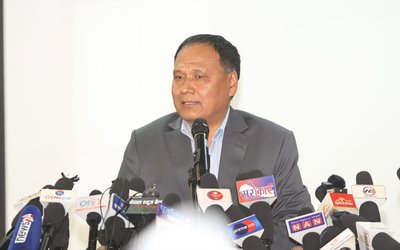
Public security is essential to existential guarantee, personal pursuits and professional concerns of citizens. It is equally important to locate, report and educate the public for reform and renewal of the social, economic and political life of this post-conflict nation. Public security is largely the function of state agencies which ensures the protection of citizens, laws and institutions against threats to their well-being. To meet its increasing challenges, responsible public institutions should be made effective to enforce solidarity of citizens with the state, context-sensitivity in security strategies and strengthening trust and cooperative action with the ordinary people. Self-censorship of critical masses of civil society, human rights bodies, consultants and media, induced either by profit incentive or risk, reduces them to a mere spectator, not deliberative public, and fosters a culture of silence among the voiceless section of society.
Former Police Council Nepal, The Relief Trust and Peace and Development Studies organized a national seminar on “Democracy, Trust and Public Security,” on April 4, 2014 in Kathmandu in cooperation with Friedrich- Ebert- Stiftung (FES), Nepal office. Chief Guest of the program Krishna Hari Banskota, Secretary at the Office of the Prime Minister and Council of Ministers, said that the system of incentives and punishment, clear boundaries between civil and security and set up of a think tank to analyze the changing nature of threats, early warning, sharing of security planning experience with the retired senior officers and concrete recommendations can improve the condition of public security in the country. He added that instead of increasing the number of security personnel, efforts should be made to improve the quality of security. He also expressed readiness to implement concrete measures arising out of the current need of public security.
The officiating DIG Rajendra Singh Bhandari of Nepal Police highlighted five points to be taken into account for public security strategies: areas of security concern; balancing the role of various institutions and authorities including criminal justice system; evaluation of the causes of success and failure focusing on emerging security trends; sense of direction of security or a road maps outlined by the constitution; and realization of the public expectations from the security and security’s expectation from the civil society, parties and public institutions. These are important considerations to build public security and peaceful resolution of conflict. He added that security is based on predictability of the environment—a condition that liberates citizens from fear and basic needs deficits and norm-based behavior of all actors and stakeholders.
Brigadier-General (rtd) Deepak Gurung argued that democracy, trust and security are interlinked. Security is an all-pervasive concept which involves options from school, job, production, investment to individual pursuit of life, freedom and happiness. In the absence of security, public trust deteriorates and democracy cannot survive. A sound public security requires the accountability and discipline of all sides from direction giving body to decision takers and implementers of decisions. We have to see the causes of conflict and develop mechanism of justice, development and education to expand security spheres. Similarly, AIG, Ishwor B. Tamang of Armed Police Force stressed on early drafting of constitution with democracy, good governance and peace dividend components. Lal Bahadur Thapa, on the other hand, focused on effective role of intelligence in improving the integrity of security agencies, public awareness and response effectiveness about upcoming security threats.
Head of FES Nepal Dev Raj Dahal said that public security is the responsibility of public officials of the state. But they cannot become effective unless they maintain the integrity of office and are supported by watchful eyes of citizens and attentive public built on mutual trust of each other. In Nepal, public institutions are weak and social and economic order is fractured by distrust and anomie. While hard institutions of the state—military, armed police force, police, intelligence and public administration-- are responsible for physical security, a sense of psychological safety is the work of public trust--vigilant public, media, civil society and attentive citizens-- as they are responsible to provide early warning of social risks, generate relevant critical information, trust, opinion building, preference-formation and policy formulation. Public security is important to create “business friendly environment” to expand peace infrastructures, accomplish the national task of state-society coherence and participatory nation-building and peacebuilding. Democratic functions of “active citizens” require them to make the governance accountable as it is the way to bolster the life-world of people and serve as a watchdog of political power.
Former secretary Bhola Thapa said that all should work together to make Nepal beautiful, peaceful and prosperous and help it overcome the legacy of conflict. We should not waste time and misuse the hard earned money sent to us by our youths from aboard. Three papers were presented on the seminar by respective authors-- Ruskar Regmi, Additional-Inspector General (rtd), Joint Secretary of Peace and Reconstruction Ministry Shyam Sunder Sharma and Ms. Chetana Lokshum while chairman of Administrative Court Kashi Raj Dahal, Krishna Hari Banskota, Secretary, and Deependra Sharma, Joint Secretary of the Peace and Reconstruction Ministry chaired the respective sessions. There were altogether 131 participants representing serving and retired police, Nepal Army, Armed Police Force, intelligence agency, civil society, journalists and political leaders.
- IME GROUP: Expands Into Paper Industry
- Mar 24, 2025
- CPN UML: Instigated By India
- Mar 23, 2025
- ADB’S CHIEF ECONOMIST: Nepal Reduces Poverty
- Mar 11, 2025
- FM DR. DEUBA: A Successful Visit
- Mar 11, 2025
- MD GHISING: Target Of Personal Grudge
- Mar 09, 2025















